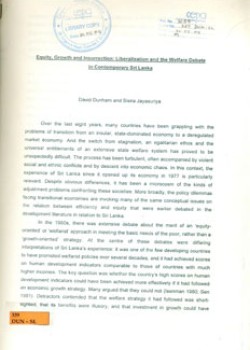
Equity, Growth and Insurrection
Liberalisation and the Welfare Debate in Contemporary Sri Lanka
Author : Dunham, David and Jayasuriya, Sisira
Page Numbers: 16
Acc. No: 3088
Class No: 339 DUN-SL
Category: Books & Reports
Subjects: Macroeconomics
Type of Resource: Monograph
Languages: English
This paper focuses on the economic consequences of policy reforms and their social and political impacts. Protagonists in the 1980s, debate on equity and growth in Sri Lanka claimed to show that economic liberalization could deliver growth without jeopardizing equity, and the main lesson that they drew from the Sri Lankan experience - that welfarism should be abandoned - helped to reinforce neoliberal policy reforms of the Washington institutions. This paper shows that their conclusions were heavily dependent on the time frame employed and on the concept of welfare and inequality that was utilized, and that they seriously underestimated the importance of state welfare expenditure in buying social peace. Perceived relative inequality is seen to have increased remarkably, with perceptions magnifying objective changes in distribution that coincided with the withdrawal of public support systems.



